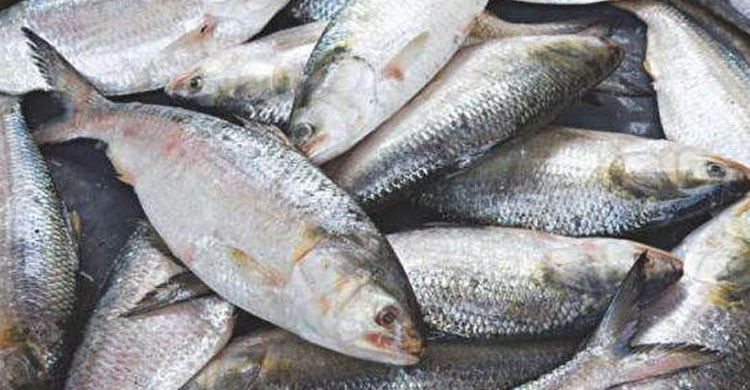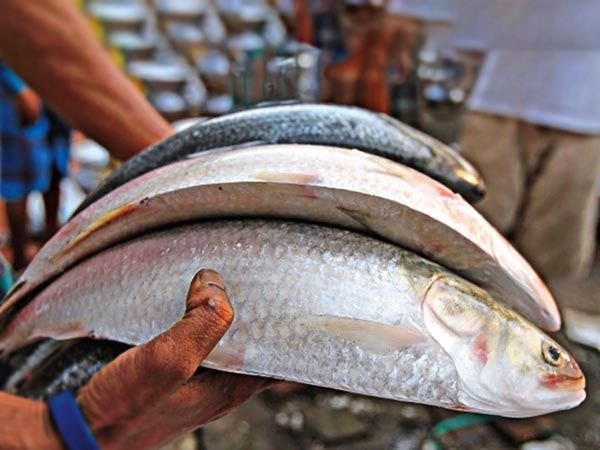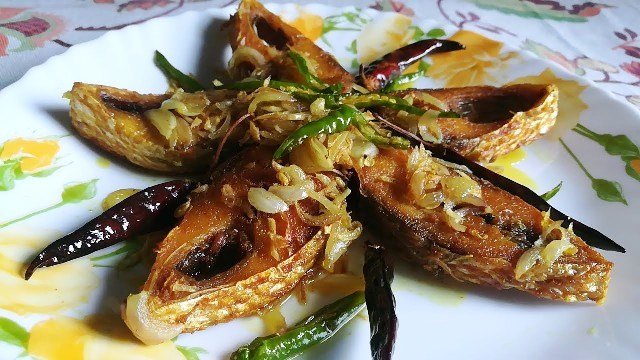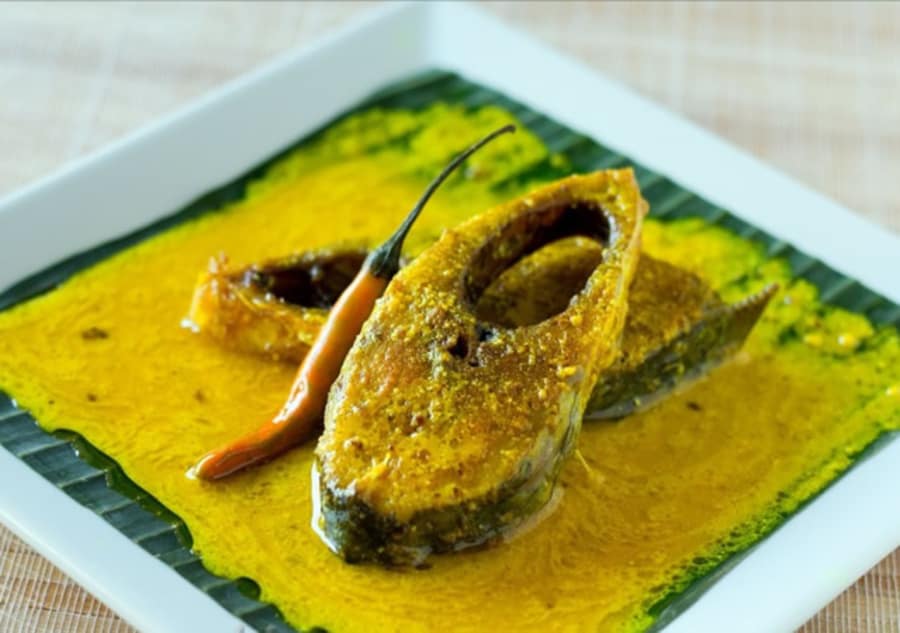# Hilsa (ইলিশ)
Hilsa (ইলিশ)

Photo source
Hilsa (logical name: Tenualosa ilisha ) is the national fish of Bangladesh. It is an ocean angle, which falls in the waterways of Bangladesh and East India for laying eggs. Hilsa is extremely mainstream for the Bengalis. Aside from this, a fish well known in various regions of India ,, for example, West Bengal , Orissa , Tripura , Assam , as a hilsa sustenance. Hilsa angle in Bangladesh are perceived as Geographical Indicators or GI Products in the year 2017.
The word 'hilsa' is found in Bangla dialect , Assam , and the Telugu is articulated as Polasha ( Telugu : పులస Pulasa or Polasa ). The Sindhi dialect of Pakistan is called (Sindhu: پلو مڇي Pallu Machhi ), in Oriya ( Oriya : ଇଲିଶି Ilishii), known as Moden (spouse) or Palva (Male) of the Hilsa angle in Gujarat. Hilsa is financially critical tropical fish. The Bay of Bengaldelta , Padma - Meghna - Jamuna River is accessible consistently from a lot of Hilsha angle. It is ocean angle yet this fish gives eggs in enormous streams. Hilsa angle backpedal to the ocean when the egg develops and the child develops (Jatka, which is in Bengali). Onthe path back to the ocean the anglers get this fish. This fish has numerous little cuts so it is exceptionally watchful to eat.

Photo source
Despite the fact that hilsa saline water or ocean angle, they are for the most part on the oceans, however they can cross the separation of around 1200 km to imitate in the Indian subcontinent. The ordinary separation of the waterway in Bangladesh is 50 km to 100 km. Hilsa is discovered chiefly in the Padma (a few sections of the Ganges ), Meghna (a few sections of Brahmaputra ) and Godavari stream of Bangladesh.Meanwhile, the essence of haldi of Padma is thought to be the best. The Rupnarayan stream of India, the Ganges and the Godavari waterway are well known for their heavenly eggs. Hilsha angle is likewise gotten from the ocean, yet the fish of the ocean in the ocean isn't as flavorful as the fish. This fish is likewise found in Sindh area of South Pakistan. There the fish is known as Palla. These fish are found in little amounts in the Thatta region. Palla or hilsa can not be seen now as a result of the defeat of the Indus waterway.
Classification:
The logical name of Hilsa is Tenualosa ilisha . It has a place with the Clupeidae (family). It is the neighborhood fish of Bangladesh and West Bengal .
Residence
It's saline water. Typically the channels associated with the enormous streams and bequests are found in the stormy season . As of now, the fish of the hilsa tumbles from the sea to the huge waterway and the channel appended to the estuary. Hilsha fish can not be cultivated.Fishermen go angling in angling vessels and angling by catching them. These fish were conveyed to the beach front zone. From that point, ice is sent to remote spots of the nation. Hilsa angle is found in the three nearby waterways of Chandpur District .Chandpur region is well known for its Hilsa. Bangladesh additionally acquires a considerable measure of remote cash by sending out Hilsha angle.
Food fixings and cooking
Doi_Ilish
Photo source
Panta Hilsa - Panta Rice , Hilsa Fish Fry, and Shotki, Popular Foods of First Boishakh Festival
Hilsa contains unsaturated fats ( omega 3 unsaturated fats ) that are rich in greasy fish and hilsa. Late investigations have discovered that this corrosive lessens cholesterol and insulin levels in the pee.
Rice, Hilsa, Hilsa Patturi, Cold Frozen, Dopaaja and Mango are extremely mainstream. Kachur leaves and hilsa angle cut, head and so forth hours unique cooking. Eggs are cooked particularly by the hilsa angle and the fine rice, which are known as rice or rice of Hilsha angle . This is an extraordinary cook of stormy season. In Bangladesh, this hilsa is cooked in various ways, bubbled, broil, cooked, blended with banana leaves, with mustard seeds, cumin seeds, brinjal, pineapple and dried. It is said that there are in regards to 50 food of Hilsa angle. Hilsa eggs and extremely well known nourishment. This fish needs almost no oil to cook on the grounds that the hilsa angle have a lot of oil. Hilsa of North America isn't generally accessible, on the grounds that the Bengali individuals picked Saad as a contrasting option to angle. Saad angles are considered as contrasting options to hilsa on the grounds that the shading and taste of this fish are relatively similar to hilsa.
Hilsha in various societies:

Photo source
Numerous Bengali Hindu families purchase two hilsa fish or two hilsa angle at best of love. It is viewed as a decent indication of purchasing two sets of hilsha in Saraswati Puja and Lakshmi Puja . In any case, this convention was common among Bengali Hindus of East Bengal (the present Bangladesh), a considerable lot of whom now live in West Bengal , Assam and Tripura after parcel of India. A large number of them commit Hilsa fish to Lakshmi Devi. Numerous individuals think Puja is deficient without relinquishing the hilsa.
Naming:
Fishboys (Froisei and Polly 2017) have been given the name of this Hilsa in 25 dialects (articulated from the English word, it may not coordinate the local elocution.) Fishbase has stated, Hilsa is called all around by Hilsa Shead and Aloas Hilsa. In Bangladesh it is said that, in a few zones of the nation, the Hilsa angle, the hilsa, the Padma-Hilsa, and the Jatka-are otherwise called Ilaas. Myanmar isn't called Burmese dialect , neither Tha-Lok, nor-Thalank. In India, Bengali talking individuals said to Hilsa and the more youthful Hilsa Khika Hilsa. In Assamese dialect it is called 'Ilahi'. Telugu is called Palasah, Palasah, Palia, Polasa. The Gujarati dialect is called Chakshi, Chakasi, Chaski, Palla. In Hindi it is called Hilsa, Pala. Kannada dialect is called Mullasu, Palas, Palia, Polasa. Malayalam is called Paliya, Paluva, Valava. In Marathi, it is called Pala, Pala, Palava. It is said in the even dialects that the Hilsa, the Ilias, the pendulum In Tamil, it is said that Ullam, Venganni, Seva. Sri Lankan Tamil is known as Hilsa Sevva, Ullalam. In Pakistan, the Hilsa is called Pala and Urdu is called Palo and Pulala. K in Vietnam is called Hilsa. In the United States, the worldwide name is called Hilsa. In the UK it is called Hilsa Herring. In Poland, Polish is called Hilza Indijska. In Portuguese, Hilsa is referred to in Portuguese as a turn. The name of the hilsa in Czech dialect is Plakka Ila, Slad Palasah. Hilsa's name in Denmark is Hilsa-Stamsled. Hilsa in Spanish is named as Sabla Hilsa.Swedish dialect is called Hindska stackscill. Hilsa in Estonian dialect is called India Sililosa. In Russia this hilsa is called as Tanuulosa in Russian dialect. Hilsa's name in Arabic is Shore. In Iran, Hilsa is brought in Persian by a few names. For instance: Bark, Mahi Khore Kuchiku, Sabor, Sabur, Jabur, Jamur. Hilsa is called as Chakori in Oman. In the Mandarin Chinese dialect, the name of Hilsa in China is echacha.
Current status and conservation in Bangladesh
As indicated by the red rundown of IUCN Bangladesh (2000), this species isn't undermined in Bangladesh.
